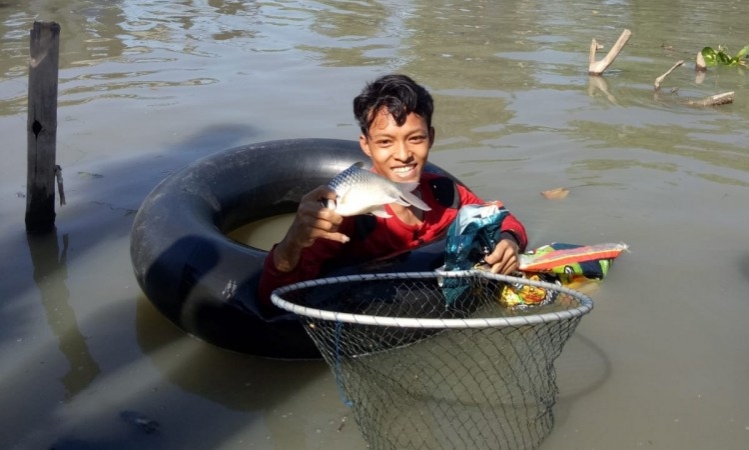 A citizen found dead fish in Surabaya River due to industrial waste. (Image via: Ngopibareng)
A citizen found dead fish in Surabaya River due to industrial waste. (Image via: Ngopibareng)
Paper beats a thousand fishes in Surabaya
SURABAYA - More reason for mankind to consider going all digital. On Monday (22/7) at 10.00 a.m., people filed a complaint to Ecological Observation and Wetlands Conservation (Ecoton) regarding a phenomenon of mass death of fishes (ikan munggut) which occurred in Surabaya River that flows between Gresik and Sidoarjo Regencies, East Java, Indonesia.Operational Director of Ecoton, Amir Udin, stated that the complaints were in since 10.00 a.m., and they piled up until its peak at 11.30 a.m. yesterday.
Udin revealed a shocking fact that the phenomenon was recurrent. In July 2019 alone, the phenomenon has occurred 4 times, in the same Surabaya River that flows between Gresik and Sidoarjo.
Approximately, a thousand fishes died in the river. The sizes of fishes that died in the river also varied from the size of an adult’s palm to the size of an adult’s arm. The kind of fishes found dead in the river ranged from Java barb, Mystus, Nile tilapia, and Hemibragus (a kind of catfish).
There was an allegation that the fishes died due to industrial waste, precisely from a paper industry located nearby the river. Due to the scorching summer, the river's discharge decreased. The allegation, however, was not without foundation.
Having conducted a field inspection, an Ecoton team reported that the phenomenon is not found in the river flowing before the location of the factory. The mass death occurred in the river stream located after the location of the factory.
It is best not to consume the fish, suggested Udin, since the dead fishes have been contaminated with chemical, toxic waste from the paper factory. In other words, the fishes are now carcinogenic and inedible.
Also, he warned the paper factory to control its waste over the river because it approaching the intake local Water Utility (PDAM). Water from Surabaya River has been the raw material of drinking water for people in Surabaya, Gresik, and Sidoarjo Regencies. The effect could be lethal if the unfiltered drinking water got into people’s hands.
Amir Udin said the report had been submitted to the Environment Agency of East Java Province. He hoped that the agency would take action to assist the people to tackle the phenomenon and to sanction the factory should it be proven guilty of the waste.
Source: https://www.cnnindonesia.com/nasional/20190723063947-20-414559/ribuan-ikan-kali-surabaya-mati-diduga-terpapar-limbah-pabrik
 English
English Japan
Japan

best sex scenes in games brother and sister play sex games princess sex games
prednisone methylprednisolone prednisone 20 mg tablets does prednisone make you thirsty how soon does prednisone work
prednisone shelf life deltasone 10 mg tablets what is prednisone 10mg used for what does prednisone do to your body?
price of viagra in mexico funny one liners for women cialis doesn't work order prescription viagra online best libido enhancer for men tadalafil 20 mg lowest price india
viagra plus dapoxetine buy dapoxetine dapoxetine dose for premature ejaculation how effective is priligy
neurontin bipolar benefits and side effects of neurontin how to discontinue gabapentin
ild and plaquenil does plaquenil raise your liver enzymes how quick will symptoms return after you stop plaquenil
amoxicillin tooth infection amoxicillin for sale for humans 500 mg amoxil 875 be broken i half amoxicillin dose calculator
herbicide mode of action table cvs drug prices check buy viagra cheap huggies samples for physicians goodrx viagra effects video price for viagra cialis vs finasteride for bph atorvastatin and viagra whats viagra buy painkillers online overnight libido vitamins for women women take viagra vgr 100 side effects best ed tablets best natural sexual supplements for men walgreens viagra substitute viagra homme tadalafil 20mg india walmart medication list walgreens medicine online viagra drug interactions with flomax humalog savings card viagra without a doctor prescription does xanogen male enhancement work cost of viagra 100mg cvs viagra receptfritt belviq free trial voucher grapefruit drug interactions full list
microdosing modafinil buy provigil generic online is modafinil legal in canada how many people lose weight on modafinil
priligy uk generic where to buy dapoxetine online viagra generic dapoxetine 160mg reviews how to take dapoxetine for pe
how well does sildenafil work cvs caremark mail prescription best supplements for ed gnc viagra tablets uk side effects of viagra for men pink triangle pill purchasing viagra on the internet
buy ivermectin order stromectol online ivermectin for humans covid 19 what is the exact ingredient of ivermectin for luce treatment?
ivermectin tablet ivermectin online does ivermectin kill heartworms in dogs what can an ivermectin overdose human
azithromycin purchase zithromax pfizer zithromax walgreens over the counter what are the serious side effects of azithromycin?
lasix fluid pill furosemide discount what is a lasix renogram how to take furosemide
long term effects of cialis cialis 5 mg price cvs sildenafil generic 100mg compra viagra average cost of cialis daily overnight viagra delivery usa
goats ivermectin cost of ivermectin cream ivermectin .08 dosage for dogs ivermectin how long before you can butcher
amoxil bottle amoxicillin without a doctor's prescription amoxil 500 for sore throat difference between amoxil and penicillin
neurontin taper schedule gabapentin 900 mg tablet extra pyramidal signs of neurontin how to enhance gabapentin
dollar tree coupon policy women's viagra samples signs of high libido viagra triangle chicago viagra for dogs side effects buy generic drugs from india list of medications affected by grapefruit